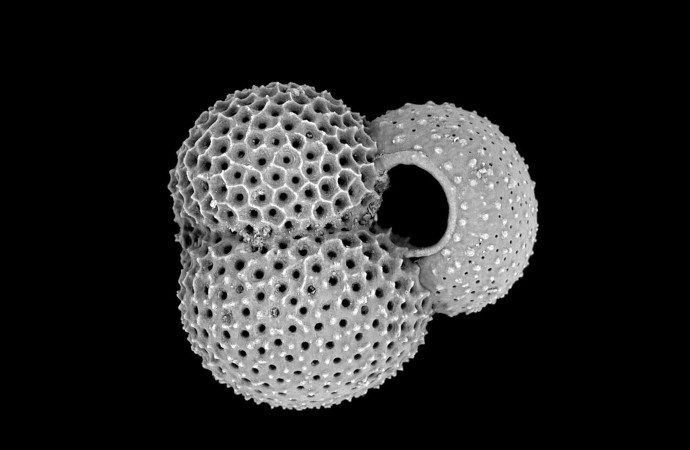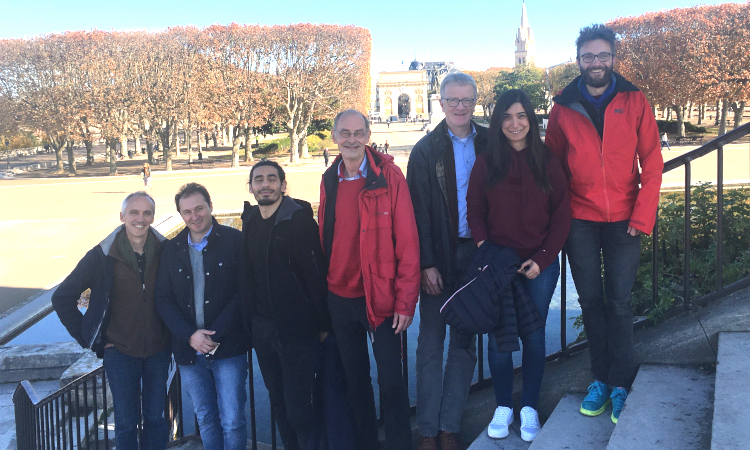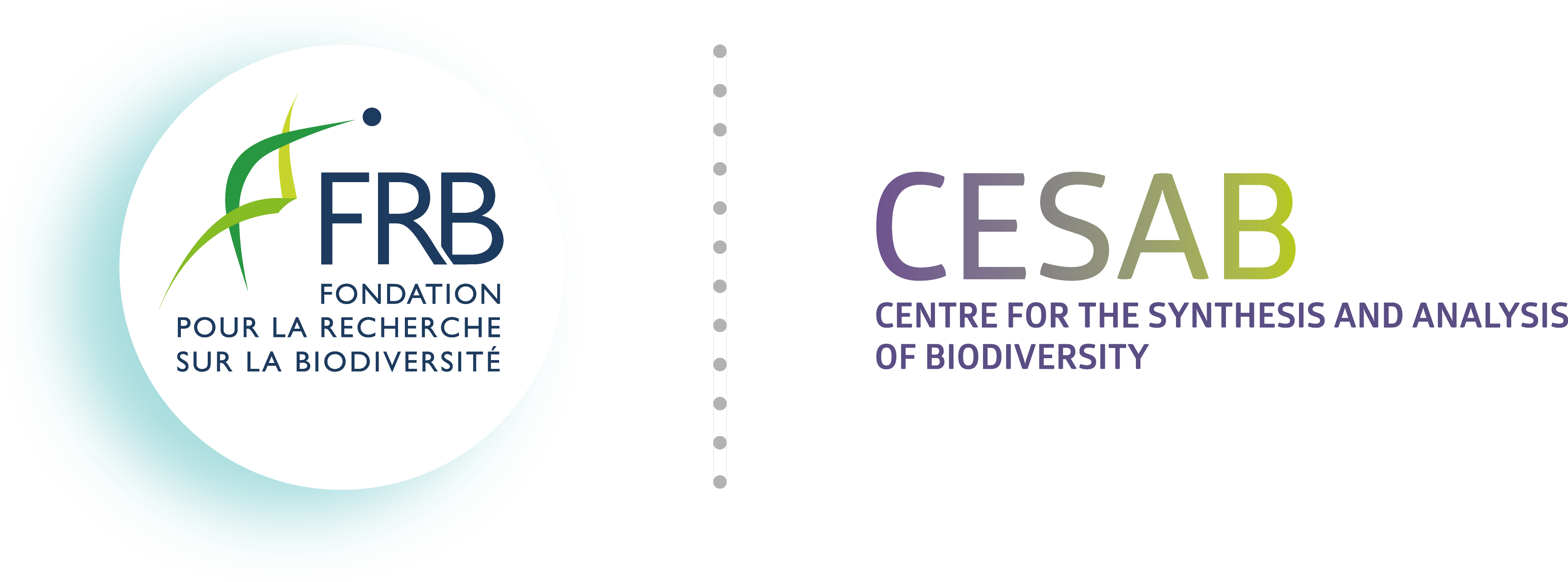FORCIS
Foraminifera response to Climatic Stress: evaluating biodiversity changes of calcifying zooplankton in response to multiple stressors
 © MNHN
© MNHN Anthropogenic CO2 emissions lead to oceanic warming, and a decrease in surface water pH. Such ocean acidification (OA) is known to affect calcifying plankton groups, a key component of the carbonate pump. Fossilized shells of planktonic foraminifera comprise a major carbonate flux to the deep sea, which makes understanding their dynamics vitally important to decipher in a rapidly changing global climate. Historical changes in planktonic foraminiferal assemblages have not yet been synthesized globally, despite numerous individual collection efforts.
The FORCIS project is filling this critical gap with a global synthesis with modern digital tools of data management and analysis. Evidently, these organisms are responding to environment change. FORCIS assesses census counts and hydrographic data since the early 1950’s to yield insights into key biodiversity metrics over the past decades, and thus also improve eco-physiological and population dynamics models.
The ultimate FORCIS goal is to understand the importance of the main stressors such as temperature and OA that govern species distribution and calcification processes, with focus on present and near-future ocean impacts.
More informations about FORCIS

FORCIS project members in Montpellier in November 2021

Principal investigator:
Thibault de GARIDEL-THORON – CEREGE, CNRS (France)
Post-doc:
Sonia CHAABANE – FRB-CESAB (France)
Grégory BEAUGRAND – Wimereux (France); Gert-Jan BRUMMER – NIOZ (Netherlands); Xavier GIRAUD – CEREGE, CNRS (France); Mattia GRECO – MARUM (Germany); Maria GRIGORIATOU – Universty of Britsol (UK); Hélène HOWA – University of Angers (France); Pincelli HULL – Yale University (USA); Lukas JONKERS – MARUM (Germany); Michal KUCERA – MARUM (Germany); Graham MORTYN – UAB (Spain); Azumi KUROYANAGI – Tohoku University (Japan); Julie MEILLAND – MARUM (Germany); Ralf SCHIEBEL – Max Planck Institute for Geochemistry (Germany).
FORCIS gathers specialists in marine zooplankton ecology, geostatistics, modelling and evolutionary biology.
FORCIS was selected from the 2018 call for proposals. The selection process was carried out by an independent Scientific Committee.
FORCIS presented their results in a webconference (CESABINAR) that you can (re)watch here:
[06] Casajus N, Chaabane S, Giraud X, de Garidel-Thoron T & Greco M (2025) forcis: An R package for accessing, handling and analysing the FORCIS database. Journal of Open Source Software, 10, 9217. DOI: 10.21105/joss.09217.
[05] Chaabane S, de Garidel-Thoron T, Meilland J, Sulpis O, Chalk TB, Brummer G-JA, Mortyn PG, Giraud X, Howa H, Casajus N, Kuroyanagi A, Beaugrand G & Schiebel R (2024) Migrating is not enough for modern planktonic foraminifera in a changing ocean. Nature, 636, 390-396. DOI: 10.1038/s41586-024-08191-5.
[04] Chaabane S, de Garidel‐Thoron T, Giraud X, Meilland J, Brummer GA, Jonkers L, Mortyn PG, Greco M, Casajus N, Kucera M, Sulpis O, Kuroyanagi A, Howa H, Beaugrand G & Schiebel R (2024) Size normalizing planktonic Foraminifera abundance in the water column. Limnology and Oceanography: Methods, 22, 701-719. DOI: 10.1002/lom3.10637.
[03] Smart SM, Schiebel R, Jochum KP, Chaabane S, Jentzen A, Repschläger J, Stoll B, Weis U & Haug GH (2024) Sightings of the Rare Globorotalia Cavernula in the Subantarctic South of Africa: Biogeochemical and Ecological Insights. Journal of Foraminiferal Research, 54, 81-94. DOI: 10.61551/gsjfr.54.2.81.
[02] Chaabane S, de Garidel-Thoron T, Giraud X, Schiebel R, Beaugrand G, Brummer G-J, Casajus N, Greco M, Grigoratou M, Howa H, Jonkers L, Kucera M, Kuroyanagi A, Meilland J, Monteiro F, Mortyn G, Almogi-Labin A, Asahi H, Avnaim-Katav S, Bassinot F, Davis CV, Field DB, Hernández-Almeida I, Herut B, Hosie G, Howard W, Jentzen A, Johns DG, Keigwin L, Kitchener J, Kohfeld KE, Lessa DVO, Manno C, Marchant M, Ofstad S, Ortiz JD, Post A, Rigual-Hernandez A, Rillo MC, Robinson K, Sagawa T, Sierro F, Takahashi KT, Torfstein A, Venancio I, Yamasaki M & Ziveri P (2023) The FORCIS database: A global census of planktonic Foraminifera from ocean waters. Scientific Data, 10, 354. DOI: 10.1038/s41597-023-02264-2.
[01] de Garidel-Thoron T, Chaabane S, Giraud X, Meilland J, Jonkers L, Kucera M, Brummer G-JA, Grigoratou M, Monteiro FM, Greco M, Mortyn PG, Kuroyanagi A, Howa H, Beaugrand G & Schiebel R (2022) The foraminiferal response to climate stressors project: Tracking the community response of planktonic foraminifera to historical climate change. Frontiers in Marine Science, 9, 827962. DOI: 10.3389/fmars.2022.827962.